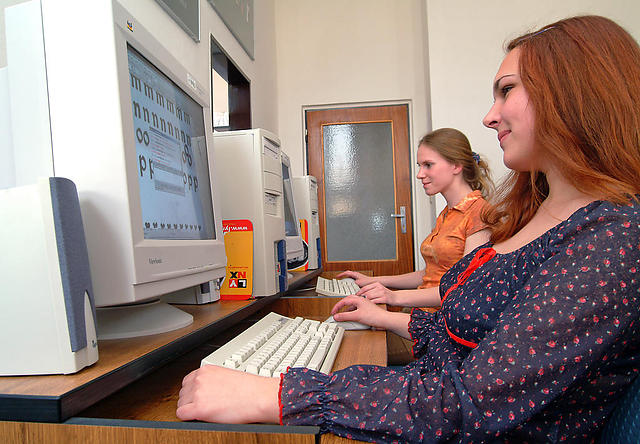Women in IT or inspiring women at FI
The Faculty of Informatics (FI) strives to motivate and inspire all "IT women" - women in academic positions, women researchers, women students, women in leadership positions, and women in all non-academic and non-scientific positions. Meet the inspiring women at FI who work in all our departments, the Centre for Education, Research and Innovation in Information and Communication Technologies and the Centre for Computing, as well as the women speakers at the Computer Science Colloquium.
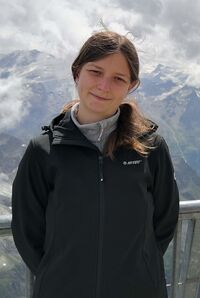 Mgr. Anna Řechtáčková
Mgr. Anna Řechtáčková
student of the 1st year of the doctoral study programme
Department of Programming Theory
My master's thesis inspired me to pursue science (at least as part of my PhD). I was lucky - I found a topic connecting the areas of computer science and FI activities that I like the most: programming and its teaching, and the development of an automatic tool that will save people time. So when I was deciding what to do after my Master's degree, the choice was clear. Financially it would be more appealing to develop software solutions for exclusive German clients, but this way I get to see how my work helps. I'm now researching how to effectively teach students to write more readable code, and I'm developing a tool called EduLint that automatically gives them feedback. What I especially appreciate about FI is the helpfulness of teachers to incorporate my tool into their teaching and their willingness to discuss their perspective on teaching programming. Thanks to this, my project already gives additional feedback to more than 500 students every year, and through faculty contacts we have recently managed to incorporate the project into the Umíme informatiku platform, which is used by primary and secondary school students across the Czech Republic.
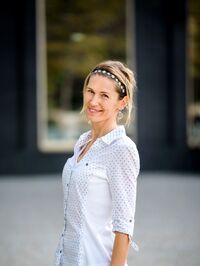 doc. Ing. RNDr. Barbora Bühnová, Ph.D.
doc. Ing. RNDr. Barbora Bühnová, Ph.D.
Associate Dean for External Relations and Cooperation with Partners, Associate Professor
Department of Computer Systems and Communications
At FI, I really appreciate the environment and support for cutting-edge research. Among the support that is crucial for me and my team is the opportunity to travel and collaborate with experts from all over the world. It gives me the opportunity to be part of an international research community and to actively participate in the organization of leading conferences in my field, which are software architectures and trust aspects in complex autonomous systems. Another valuable element for me at FI is the freedom in the direction of research, which is important for maintaining the relevance of research both in relation to current scientific knowledge and in relation to the needs of practice, with which we are in close contact thanks to the FI MU Industrial Partners Association, which I have the opportunity to lead. Thanks to this freedom, in recent years I have also had the opportunity to participate in several scientific studies to promote girls' interest in computer science (in cooperation with Czechitas), a topic that I now often present at international conferences, although it is aside from my main research.
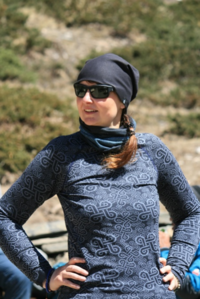 Assoc. RNDr. Barbora Kozlíková, Ph.D.
Assoc. RNDr. Barbora Kozlíková, Ph.D.
Associate Dean for Research and Doctoral Studies, Associate Professor
Department of Visual Informatics
I "grew up" at FI: I started my undergraduate studies here in 2001, and although I left for industry for a while after my PhD, I was happy to return and start my academic career here. I really appreciate the friendly working environment and the inspiration that comes from colleagues and students, which drives me forward. My position now means a lot of responsibility, but also a lot of fun and freedom in my research interests. Every day is different and full of new challenges. I am very grateful for the opportunity to start my own research group in visualization and for all the support I and my students receive. Recent research topics in our group include the exciting project "The SMC5/6 complex in nucleome organization", supported by the Ministry of Education, and more recently a project supported by the GA Czech Republic, which aims to design new visual interactive representations of chromatin fibers to help understand the complex arrangement of DNA strands in our cells. We hope that our proposed outputs will support biochemists in their research tasks.
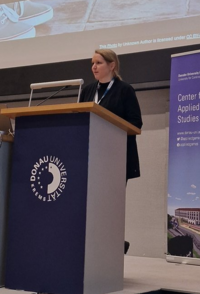 Priv.-Doz. Dipl.-Ing. Dr. Simone Kriglstein
Priv.-Doz. Dipl.-Ing. Dr. Simone Kriglstein
Associate Professor
Department of Visual Informatics
My position at FI allows me to combine my two passions as a Human-Computer Interaction researcher: Design and Games. I really appreciate at FI the opportunity and freedom to contribute to different projects in the field of Human-Computer Interaction and Games User Research. In particular, I enjoy working with students, PhD students, young researchers and colleagues on exciting research questions and topics which allows me to pursue my research in the area of Games User Research at FI. I would especially like to emphasize the helpful and collegial environment at FI, which supported me and my research from the very beginning. I'm also very passionate about mentorship to support students in their academic career journey. At FI there is, for example, the possibility to get a PhD scholarship, which is a great initiative for PhD students to get started and develop their own PhD projects.
Photo: Natalie Denk
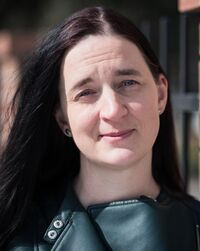 RNDr. Zuzana Nevěřilová, Ph.D.
RNDr. Zuzana Nevěřilová, Ph.D.
Assistant Professor
Department of Machine Learning and Data Processing
FI fills most of my life. It was my first choice after high school because of my major in natural language processing. I am a proud graduate and after several years in industry, I am happy to be back here. Thanks to the boom of neural networks, my field has changed significantly and started to interest many people outside of computer science. I enjoy watching these transformations and it is also a great challenge to stay up to date. What I appreciate about FI is that I can continue to develop my skills. It's also great that I can choose to stay in computer science or apply it elsewhere. In natural language processing, we are connecting computer science with other fields, and finding out how non-informaticians think. We're able to solve problems we didn't know were bothering someone. But the most important thing in my work is the people around me, and there are many inspiring ones at FI.
 Mgr. Magdaléna Kejstová
Mgr. Magdaléna Kejstová
Research Associate
Department of Visual Informatics
My educational journey at FI started with a Bachelor's degree, which was my first and only choice after high school. The main reason was that I had the opportunity to combine subjects from all faculties and gain a broader range of knowledge beyond my core curriculum. I studied Visual Computing and now my PhD allows me to combine multiple disciplines in one project - UX design, visualization, games and development. The project I am working on under the supervision of Priv.-Doz. Dipl.-Ing. Dr. Simone Kriglstein, in collaboration with the Austrian Computer Society and the University of St. Polten, called Vis4School, focuses on the development of digital learning materials. These materials, including animations, tutorial videos and an educational game, are designed to teach high school students about data visualizations - how to interpret and construct them. What I appreciate about our lab is the freedom and friendly working environment along with the endless opportunities to learn new things.
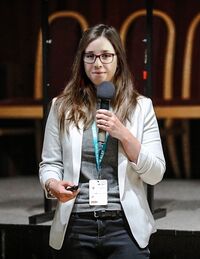 Karolína Dočkalová Burská, PhD
Karolína Dočkalová Burská, PhD
Specialist
Centre for Education, Research and Innovation in Information and Communication Technologies
I see the main benefit of my studies and research position in the possibility of self-realization. It is common practice at FI to collaborate on diverse projects across disciplines and outside the country. I am working on visual analytics for cybersecurity education and I am also finishing my PhD in this area. I enjoy pursuing work that is meaningful to me, can take me somewhere and where I can develop and find my own paths. And if you want to get out of your social bubble and are not afraid to step out of your comfort zone, there are plenty of opportunities in workshops, internships or conferences thanks to the chance to travel to these international meetings and have fun with people who are passionate about their field and can contribute to opening up new perspectives and opportunities. Last but not least, I can also help guide other students, whether through teaching or thesis supervision, to find what they enjoy and help them find meaningful employment.
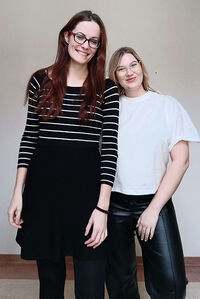 Mgr. Jana Blahošová
Mgr. Michaela Lebedíková
Mgr. Jana Blahošová
Mgr. Michaela Lebedíková
Researcher
Department of Machine Learning and Data Processing
At FI, we work as social scientists in an interdisciplinary team looking at the impact of technology on user well-being. We are currently part of the GACR EXPRO project Modeling the future: Understanding the impact of technology on adolescent's well-being (more about what we specifically do at FI
HERE). In this project we have the opportunity to combine our expertise as social scientists with our colleagues as computer scientists, which is what we value most about our work. For example, together we developed a unique mobile app designed to collect objective data from adolescents' phones, which our participants then downloaded to their phones from Google Play. We also find the collaboration in the field of machine learning fascinating. We developed annotation manuals based on social science findings and trained annotators who then searched for occurrences of risky behaviors and social support in the adolescents' conversations. Our informatics colleagues then trained machine learning models on this data that have the potential to detect these phenomena in everyday conversation.
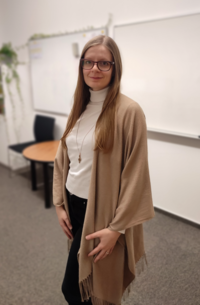 RNDr. Katarína Furmanová, Ph.D.
RNDr. Katarína Furmanová, Ph.D.
Assistant Professor
Department of Visual Informatics
I did my entire undergraduate studies at FI and after a post-doctoral position abroad, I was happy to come back here. As a student, what I valued most about FI was the opportunity to choose from a wide range of courses and to get involved in practical and research projects during my studies, which ultimately led me to stay in academia. Opportunities to travel, gain experience from abroad, and establish collaborations with other research groups also played a role. I am glad that FI supports these activities. It is also important for me because I am doing research in the field of biomedical visualisation, which requires collaboration with experts from other fields. This brings with it some challenges but at the same time I am constantly learning something new and educating myself in other areas. This is what I really enjoy about my job and I am grateful to be able to work in an environment that allows me to further develop myself in this way and share my experiences with students.
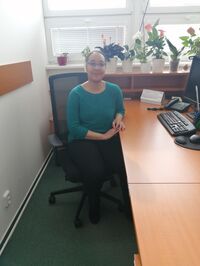 Hind Bangui PhD
Hind Bangui PhD
Research Associate - Postdoc
Department of Computer Systems and Communications
At FI, I work as a Researcher. My primary research interests include Artificial Intelligence, Human-Computer Interaction, and Smart Environments. FI gives me a valuable opportunity to join a good and flexible international research community. Also, FI supports me in overcoming challenges and advancing progress in my research by helping me participate in international scientific events and meet scientists around the world whose work fits into my research. These valuable opportunities make FI an inspiration to me and to any woman scientist who wants to step out of her comfort zone.
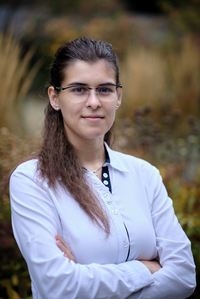 Mgr. Lucia Hradecká
Mgr. Lucia Hradecká
Winner of Brno Ph.D. talent 2022, student of the 2nd year of the doctoral programme
Department of Visual Informatics
I have been involved in research activities at FI since the beginning of my Master's studies. Thanks to this, I got an idea of what kind of research is done at FI and the desire to continue it after my Master's degree. My PhD studies at FI give me opportunities that I would hardly find in the private sector: flexibility and freedom in my research, support for research stays abroad and the possibility to collaborate on interdisciplinary projects with other groups. At FI I also have the opportunity to work in a team of curious people who like to push their horizons and in a supportive atmosphere. In addition, the faculty encourages the dissemination of research awareness among individual researchers or groups through lectures and discussions, which allows me to broaden my horizons beyond my research area. Overall, this allows me to arrange my work schedule in a way that suits me best: finding the right balance of research and learning, exploring in depth and expanding my general overview, and to some extent, who and what I will collaborate with.
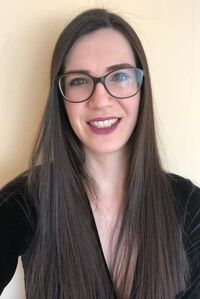 Iris Kico, Ph.D.
Iris Kico, Ph.D.
PhD graduate
Department of Machine Learning and Data Processing
As a PhD student at FI, I appreciate the opportunity to work in a supportive environment where I have freedom in my research that combines different research areas, like human-computer interaction, data analysis, and machine learning. During my PhD studies, I have had the chance to use high-end equipment for experiments. However, more importantly, I have met and worked with many great colleagues and scientists. I have participated in and contributed to several projects where I had an opportunity to travel, present my work at international conferences, and broaden my knowledge. Another great thing about FI is that the PhD students are financially supported, and their work is well recognized. I am grateful to be a part of this great community where I have always felt seen and welcome.
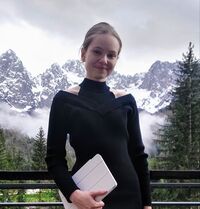 Mgr. Kristýna Pekárková
Mgr. Kristýna Pekárková
3rd year PhD student, research assistant
Department of Programming Theory
Thanks to the DIMEA lab, I got involved in research at FI during my undergraduate studies - first by participating in seminars and lectures and later by collaborating on papers with lab members and co-authors from abroad. This led to my decision to continue my research in theoretical computer science not only at the master's level, but also later at the doctoral level. Being able to get involved in research relatively early on made it easier for me to get a feel for how it works. It also gave me the opportunity to gain many contacts at universities and research institutions abroad. This helped me a lot at the beginning of my PhD studies, and I think that the support of the faculty and the individual labs in getting students involved in research activities and in participating in international research visits, lectures and conferences is very important. I am very happy to be studying at a faculty that creates and supports an environment for this collaboration.
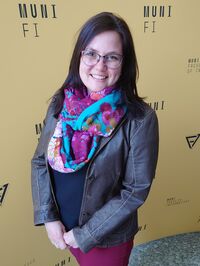 Mgr. Dana Kozlová
Mgr. Dana Kozlová
ICT Specialist
Computer Technology Centre
I joined the Faculty of Informatics, more precisely the MU Information System team, in 2008, when I was still a library student. I started as a user support and I always enjoyed my work, as it combines everything I like - communication with people, problem solving, giving practical advice and information technology. Later I became the coordinator of the IS-technician team and started to participate more in the development of the IS. I like that every day brings new challenges and the opportunity to learn something new. Developments in IT have taken a frantic pace, but this has created new opportunities to make our users' daily work and responsibilities easier and our vision of an "e-university" is becoming clearer. I really appreciate my colleagues and the fact that I get to meet intelligent and inspiring people at work. For many of us, working for IS is a "matter of the heart" and we are doing our best to ensure that it continues to develop and remains (dare I immodestly say) the best learning system in the country.
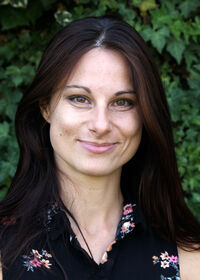 Mgr. Kamila Urban, PhD.
Mgr. Kamila Urban, PhD.
Lecturer at the FI MU Informatics Colloquium
Researcher, Department of Psychology, Faculty of Arts, Charles University / Institute of Psychology of the Slovak Academy of Sciences, v. v. i.
I came to the Faculty of Informatics thanks to an invitation to lecture at the Informatics Colloquium on metacognition and effective learning and teaching. Since I have been doing research on metacognition for several years, i.e. whether students are aware of their learning strengths and weaknesses, whether they plan their problem-solving procedure, whether they accurately monitor their understanding and whether they are able to evaluate their learning performance, I was approached to give a talk on this topic at the Department of Computer Science, but from the perspective of how teachers could develop metacognition in their students. Students in the computer science department have to solve a number of problem problems that require, in addition to domain-specific knowledge, well-developed metacognition in order to solve the problems correctly. I am always happy to offer teachers ideas on how to develop metacognition in their students, because the students will then gain not only knowledge but also skills that will help them in their future learning outside of school.
Employee benefits at the Faculty of Computer Science MU
We support the harmonization of work, personal and family life of FI employees. FI has flexible working hours and occasional home office work, part-time work is supported, and employees can place their children in the Elanek children's group in the MU building on Komenský náměstí. Obligations, advice and useful links on maternity, paternity and parental leave are available in interactive form on the
MU Employee Portal or in the
Maternity, Paternity and Parental Leave Handbook (available only after logging in).
We also strive to improve employee wellbeing. As of April 2023, the employee benefits offer has been extended to include psychological counselling and accompanying and child Multisportcards. However, there is still room for improvement, you can send us your suggestions at
pers_mmcZQYeQ@fin9_97EW_c.muniM7ix80T0f.cz.
Articles

Sofia's Journey: From Serbia to FI MU, where he focuses on forensic readiness of software systems
Read an inspiring interview with Sofija, a talented student from Serbia who decided to study in the Czech Republic and has already achieved many successes at FI MU. Her journey from her first visit to the Czech Republic and Brno, during summer school, to being awarded the "Dean's Award for Outstanding Final Thesis" is full of determination, hard work and inspiration.
Sofije is pursuing a Master's degree in Software Engineering, supported by a JCMM scholarship, and is actively involved in the research project "Forensic Support for Building Trust in Smart Software Ecosystems". This project, on which she collaborates with Barbara Bühn and Lukas Daubner, focuses on the design of methodologies for forensic readiness of software systems and has produced significant results that are internationally appreciated.
Sofije is currently studying in Italy at the University of Salerno as part of the Erasmus program, where she is expanding her knowledge and experiencing a new culture. Her dedication and achievements are an inspiration to all those interested in computer science and research. Read the full interview and be inspired by her story.
Read the full interview with Sofia in the
article on the FI website.
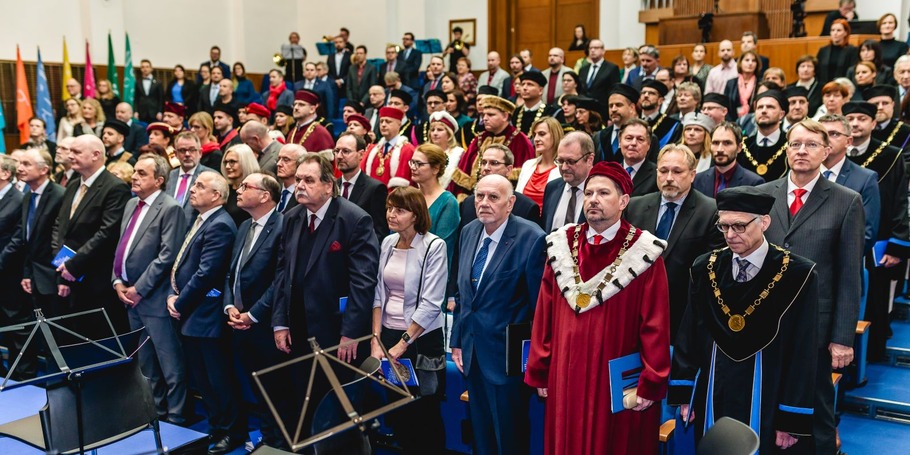
Professor Kathryn Hess Bellwald and the Women in Topology Research Network
On April 17, 2024, Professor Kathryn Hess Bellwald from École Polytechnique Fédérale de Lausanne gave a talk on "Topological Perspectives on Networks" at the MUNI Seminar Series.
Renowned for her research in algebraic topology, Professor Hess bridged the gap between complex mathematical theories and concrete applications. Through her involvement in the Blue Brain project, she is applying topological insights to complex brain networks, pushing our understanding in neuroscience. As founder of the after-school
Euler course for children, she inspires young talents and nurtures a new generation of mathematicians in Switzerland. In addition, she actively supports her colleagues through initiatives such as the
Women in Topology research network, demonstrating her commitment to creating a more inclusive and welcoming scientific community.
More information about the
Women in Topology (WIT ) research network can be found
HERE.
You can read the full interview with Professor Hess, including an appreciation of her talk and visit to FI by Professor Daniel King, in the
news on the FI website.

Anna Řechtáčková received the Brno Ph.D. award. Talent
Anna Řechtáčková graduated from the Bachelor's degree programme in Applied Informatics and subsequently from the Master's degree programme in Theoretical Informatics at the Faculty of Informatics of MU. Since 2023 she has started her PhD studies with a focus on automated methods to support programming teaching under the supervision of Assoc. Mgr. Radek Pelánek, Ph.D.
Do Brno Ph.D. Talent she applied with a project on Developing Automatic Methods for Teaching Code Quality in Introductory Programming. He is looking for ways to automatically give feedback on the quality of beginners' code. "I'm investigating which problems are common and important, how to detect these problems, and how to guide students in the right direction to fix them. The EduLint tool I'm developing to do this is already being used in FI courses and in the Computer Science Correspondence Seminar. We are also in the process of adding it to the We Can Computer Science learning environment used in primary and secondary schools," he explains.
Her research helps, for example, in the assessment of homework, and many students get feedback that no one had the capacity to give them before. In her PhD, she is also fulfilling her wish to work on something that helps people and saves them time.

Prof. Ivana Černá was awarded the MUNI medal
On the occasion of the 105th anniversary of the foundation of Masaryk University, MUNI medals were presented to Masaryk University personalities and prominent representatives of science, culture, higher education and public life on 31 January 2024 in the Karel Engliš Great Auditorium at the Faculty of Law of MUNI. The silver medal was awarded to Prof. Ivana Černá.
Prof. Ivana Černá, Head of the Department of Programming Theory at FI, has been working at FI since its foundation in 1994. During this time, she has achieved a number of scientific successes and has also contributed significantly to the development of MU from her position as Vice-Rector for Information Technology (2006-2011) and then for Studies (2011-2015). She holds and has held a number of important roles at the University and the Faculty, including membership of academic senates, scientific councils, the MU Internal Evaluation Council and the MU Ethics Committee. She also plays a key role in teaching. She is a successful investigator and co-investigator of a number of research projects, such as the Centre of Excellence for Cybercrime, Cybersecurity and Critical Information Infrastructure Protection and the Modular Distributed Robotics Platform. She has authored or co-authored more than a hundred publications in the areas of communication theory and parallel systems and formal verification.
FI Computer Science Colloquium with inspiring women in IT
The goal of the colloquia organized by FI is to present current research in various areas of computer science to a broad audience within the faculty. More information about the colloquia can be found
HERE.
23.4.2024 -
Assoc. Prof. Laura Sanita' from Università Bocconi in Milan.
12.12.2023 -
Prof. Monica Dragoicea from Polytechnic University of Bucharest, topic "Smart services, explainable AI, and smart visualisations".
9.5.2023 -
Mgr. Kamila Urban, PhD. from Charles University, topic "Metacognition within self-regulated learning".
14.3.2023 -
doc. Jana Tůmová from KTH Royal Institute of Technology in Stockholm.
20.9.2022 -
dr. Maria Luján Ganuza from Universidad Nacional del Sur, Argentina, topic.
International Day of Women and Girls in Science 11.2.2024
The theme of this year's International Day of Women and Girls in Science is "Women in Science Leadership: a New Era for Sustainability".
On 8-9 February 2024, the 9th Assembly for the International Day of Women and Girls in Science was held at the United Nations Headquarters in New York. The concept and agenda for this year's Assembly, as well as outcomes from previous years, can be found at
https://www.womeninscienceday.org/.
The 9th Assembly brought together experts from around the world, senior government officials, representatives of international scientific organizations, scientists and women scientists from around the world to discuss women's leadership in achieving the three pillars of sustainable development: economic prosperity, social justice and environmental protection.
FI webinar on the growing role of diversity in IT
In an increasingly technology-driven world, digital innovation and creativity can hardly be fully harnessed if only a small proportion of the population generates it. In this context, the question often arises - why do girls choose particular interests, study programmes and careers as an alternative to computer science or information technology? What are the motivators and benefits of these alternatives that IT lacks? Our webinar focuses on the growing role of diversity in IT, including some findings from recent studies on the topic. We'll discuss effective strategies for making IT more inclusive and open to diverse talent. And we'll share lessons learned from engaging more girls in IT, including insights and strategies specifically related to academia.
A recording of the webinar with Assoc. Ing. RNDr. Barbara Bühn, Ph.D., Vice Dean of FI, can be viewed
HERE.
International Day of Women and Girls in Science 11 February 2023
The International Day of Women and Girls in Science was declared by the UN General Assembly at the end of 2015. It is intended to commemorate the crucial role of women and girls in science and to promote their involvement in research activities.
It is said that there are as many women in IT as there are men. This is not the case at FI, e.g. 29% of PhD students are women. In the first year of the PhD programme,
Mgr. Lucia Hradecká, winner of the
"Brno Ph.D. Talent 2022" (a scholarship program of the City of Brno for the 25 best talents among PhD students who convince the expert committee of the excellence of their results and the quality of their proposed scientific project).
Handbook Maternity, paternity and parental leave in a nutshell
In December 2022, an updated MU handbook Maternity, Paternity and Parental Leave in a Nutshell was published.
The handbook aims to provide MU parents with comprehensive information in one place, guiding them from pregnancy, through maternity leave, then parental leave, as well as paternity leave, to returning back to work.
You can download the handbook
HERE.
In this context, we would like to add that MU cooperates with the Elánek mini-nursery (in the MU building on Komenský nám. and on the Bohunice campus), where MU employees can place their children. More information can be found on the
ELÁNK website.
Courses Gender Equality in the Institution and Gender Equality Plans I and II
Want to learn more about gender equality? The National Contact Centre - Gender and Science of the Institute of Sociology of the CAS offers courses on gender equality, which are designed as e-learning, publicly available training for interested women and men from universities and research organisations in the Czech Republic.
You can register for the course
HERE.
Monitoring Report on the Status of Women in Science
In December 2022, the National Contact Centre - Gender and Science of the Institute of Sociology of the CAS published the Monitoring Report on the Representation of Women in Science and Research for 2020. In it, it maps the position of women in science and innovation in the Czech Republic. The report has been published annually since 2005.
You can download the Monitoring Report
HERE.
Inspiring women in FI
We want to motivate and inspire women who are considering a career in IT. We are therefore preparing medallions on "what I enjoy and find fulfilling about science at FI" and "what I enjoy about working in IT at FI" with inspiring women in our faculty, in all four departments, CERIT and the Centre for Computing. We will be adding to these medallions on an ongoing basis.
Many thanks to all the female colleagues and PhD students involved for their cooperation.
MU Gender Equality Plan
MU implements a variety of measures to promote gender equality as part of the University's strategic commitment to the principles of transparency, equality and accountability, while at the same time balancing the work and personal lives of all its employees and students. It fulfils this commitment at the level of its units and through the activities of the University as a whole. All this is done on the basis of the
MU Gender Equality Plan for the period 2022-2024.
CAREER RESTART Grant Scheme
Since 2020, the MU Grant Agency has been implementing the CAREER RESTART grant scheme, which aims to create conditions for the integration of female and male researchers into research teams at MU after a career break, for example due to parental leave. The CAREER RESTART grants will facilitate and accelerate the return of young talented scientists to productive scientific careers and thus increase the percentage of their representation in independent/senior research positions. Detailed information can be found
HERE.

 Mgr. Anna Řechtáčková
Mgr. Anna Řechtáčková
 doc. Ing. RNDr. Barbora Bühnová, Ph.D.
doc. Ing. RNDr. Barbora Bühnová, Ph.D.
 Assoc. RNDr. Barbora Kozlíková, Ph.D.
Assoc. RNDr. Barbora Kozlíková, Ph.D.
 Priv.-Doz. Dipl.-Ing. Dr. Simone Kriglstein
Priv.-Doz. Dipl.-Ing. Dr. Simone Kriglstein
 RNDr. Zuzana Nevěřilová, Ph.D.
RNDr. Zuzana Nevěřilová, Ph.D.
 Mgr. Magdaléna Kejstová
Mgr. Magdaléna Kejstová
 Karolína Dočkalová Burská, PhD
Karolína Dočkalová Burská, PhD
 Mgr. Jana Blahošová
Mgr. Jana Blahošová
 RNDr. Katarína Furmanová, Ph.D.
RNDr. Katarína Furmanová, Ph.D.
 Hind Bangui PhD
Hind Bangui PhD
 Mgr. Lucia Hradecká
Mgr. Lucia Hradecká
 Iris Kico, Ph.D.
Iris Kico, Ph.D.
 Mgr. Kristýna Pekárková
Mgr. Kristýna Pekárková
 Mgr. Dana Kozlová
Mgr. Dana Kozlová
 Mgr. Kamila Urban, PhD.
Mgr. Kamila Urban, PhD.


